In response to the 2018 Farm Bill and the proliferation of hemp-derived intoxicants, Maine has integrated synthetic THC products, including Delta-8 and Delta-10 THC, into its cannabis regulatory framework. This integration mandates that these products comply with Maine’s established cannabis regulations, covering licensing, potency, and safety measures. Maine’s approach ensures that synthetic THC products meet the same consumer protection standards as other psychoactive substances.
2. Regulation of Synthetic THC Products
Maine classifies synthetic THC products, including Delta-8 and Delta-10 THC, under its cannabis regulatory program, prohibiting unlicensed sale or production. This classification restricts production and sale to licensed entities, subjecting synthetic cannabinoids to the same safety, testing, and licensing requirements as other cannabis products. The Maine Office of Marijuana Policy oversees compliance and ensures that all products meet state safety and licensing standards.
3. THC Potency Limits per Serving or Package
Maine enforces potency limits on all THC products, including hemp-derived intoxicants. For example, edibles are capped at 10 mg of THC per serving and 100 mg per package, applying the same standards used in the broader cannabis market.
4. Public Health Measures
Maine has instituted robust public health protections for hemp intoxicants, which include:
- Age Restrictions: Sales are restricted to individuals 21 and over.
- Packaging Standards: Child-resistant packaging is mandatory, preventing accidental consumption by minors.
- Labeling Standards: Labels must display THC content, serving sizes, and health warnings, with restrictions on marketing to avoid appealing to children.
5. License Requirements and Fees
Maine requires licenses for all entities involved in the production, processing, distribution, or sale of hemp intoxicants, with fees structured similarly to those for cannabis licenses. License categories include cultivation, manufacturing, retail, and testing, each with specific regulatory requirements. Fees vary by license type, with applicants subject to background checks, security protocols, and facility standards enforced by the Maine Office of Marijuana Policy.
6. Testing Standards
All hemp intoxicants in Maine are subject to strict testing requirements, ensuring compliance with THC potency and purity standards. Licensed laboratories conduct these tests to confirm products meet federal and state limits and are free from harmful contaminants. Each product must have a certificate of analysis (COA) verifying its potency and safety, reinforcing Maine’s commitment to consumer protection in the psychoactive market.
7. Advertising and Marketing Restrictions
Maine enforces stringent advertising and marketing restrictions for hemp intoxicants, prohibiting misleading claims and marketing directed at minors. Regulations require that advertising avoids themes or graphics that could appeal to children, aligning with the state’s broader responsible marketing standards for cannabis.
8. Retail Location and Zoning Restrictions
Retail locations selling hemp intoxicants must comply with zoning laws similar to those governing cannabis dispensaries. These zoning restrictions help prevent oversaturation in communities and restrict sales near schools and other sensitive areas. Retailers must maintain thorough records and adhere to state and local regulations for THC products.
9. Age Restrictions for Purchase and Use
Maine enforces a minimum age of 21 for the purchase and use of hemp intoxicants, aligning with the age restrictions placed on cannabis.
10. Penalties for Non-Compliance
Maine enforces strict penalties for non-compliance, including fines, license suspensions, revocations, and product seizures for violations such as unlicensed production, inadequate labeling, or unauthorized marketing.
11. Social Equity Provisions
Maine’s cannabis program includes social equity provisions that extend to hemp intoxicant licenses. The social equity framework offers fee reductions and application assistance to individuals from communities disproportionately impacted by prior cannabis enforcement, promoting inclusivity within Maine’s regulated THC markets.
12. Impact on Medical and Adult-Use Cannabis Programs
By integrating hemp intoxicants into the cannabis regulatory framework, Maine ensures that all THC products, including Delta-8 and Delta-10, meet consistent safety and testing standards. This integration supports regulatory uniformity across medical and adult-use markets, providing clarity for consumers and businesses operating within Maine’s THC product landscape.
